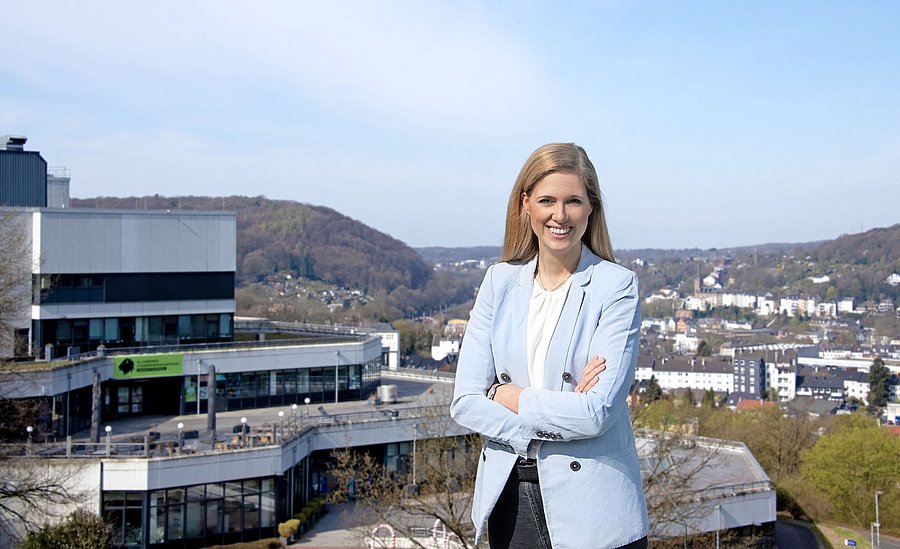Presented
At eye level with business and society

Christina Semke // Foto Friederike von Heyden
Hello Mrs Semke, nice to welcome you to our company. Without giving too much away: One of your tasks is to network the university. If you had to describe the BUW in three words - what would they be?
Since I started here, I have perceived it as diverse, approachable and solution-orientated. These are not such bad prerequisites for my tasks.
Which brings us to the topic. How do you explain to people who are not familiar with the university system what exactly you do at your new place of work? Third Mission, or transfer, are terms that not everyone is immediately familiar with.
In addition to research and teaching, the Third Mission is the third pillar of a university, in which we work on fruitful networking of the university with business and society and thus fulfil our social responsibility.
I find an image quite fitting to describe our work: We get out of the ivory tower and into the gardens. We are accessible, not isolated and, most importantly, at eye level. The general weather situation affects us just as much as our partners. Talking about the weather doesn't make trees grow any faster, so we plant together what can thrive. And harvest together too. That is my ideal concept of Third Mission.
Transfer is part of the Third Mission - we transfer solutions and knowledge from the university to the outside world. That's wonderful, but third mission can go even further: it can be dialogue-based, cooperative and collaborative. We want to emphasise this more. That's why we were keen to change the name from UniService Transfer to UniService Third Mission. In my perception, this clearly enhances the external aspect: it is not just a recipient, but also provides impetus for the university. And in the best case scenario, it also has a positive impact on research and teaching. My goal is a genuine partnership between science and society. And I consider this to include entrepreneurs, institutions and citizens alike.
Many of our 4,000 employees are already working in this way today. Our specific task is to create structure, visibility and appreciation for this, to provide impetus and support with a service centre.
Now that you have gained an overview: Have you and your team already been able to determine topics that are particularly important to you in the near future?
We have identified eight areas that we are tackling in a structured way: Cooperation management, career service, start-ups, patents, scholarships, alumni network, science communication and participation in education. As the University of Wuppertal, we already have a lot of experience in these areas. What is new is that we are starting to open up the links between these areas and make them user-friendly, so to speak. When I said at the beginning that the university is diverse, this can be a blessing as well as a curse.
We are not always intuitive for the outside world; it is not uncommon for a partner to have numerous contact persons at the university. This makes sense for answering research questions, but we can be more coordinated in the central facilities. That's why we bring together all areas that have business contacts at a central level. This pools knowledge and resources and creates trust in our partnerships. In marketing, they say "one face to the customer" - we want to get closer to this.

"There is so much we can tell." - With its research projects, the university is also helping to shape the region and society // Photo Peter Gwiazda
Universities are regarded as centres of the German science and innovation system; they contribute to the country's competitiveness through research and transfer. How can universities fulfil this expectation and responsibility in the long term? What challenges do you and your team face in your daily and strategic work?
The general challenge of Third Mission is not just to anchor this attitude of social responsibility in celebratory speeches, but to put it into practice. Just as one swallow does not make a summer, a staff unit cannot shoulder the responsibility of a university towards society. The good news is that so much is already happening.
The great thing about the University of Wuppertal is that its researchers and teaching staff are already contributing a great deal to this interconnectedness, with many representatives of the university engaging in dialogue with business and society as a matter of course. As a staff unit, we see ourselves as a control centre for this. We create a framework and the necessary connections. We take on tasks that the faculties should not be able to handle on their own, offer a stage or two and shorten distances. As a UniService, not as a water head.
Another, but not entirely insignificant challenge: the term Third Mission remains unwieldy. It sounds more like Star Trek than a business ally. But really good things often come with complicated names, such as resilience, ambiguity tolerance and Sauvignon Blanc.
Do you see any untapped potential in the area of Third Mission that you find particularly exciting?
The wonderful thing about the Third Mission is that there is a lot of potential for further development. We work in the classic fields, but just as we have been talking about the student lifecycle for a long time, we should also start thinking in terms of partner lifecycles.
At the same time, universities are used to thinking from the inside out: can what we are already doing create added value outside? Turning this perspective around opens up a lot. In other words, what external impulses can help us as a university in very different areas? However, this also means engaging in public discourse much earlier and reacting agilely to the outside world in research and teaching. Third Mission allows universities a new self-image. I find accompanying this process incredibly exciting.
You studied business administration and worked in marketing for baby care, personal care and non-prescription drugs at Johnson & Johnson, among other things. What experience that you gained in your previous positions helps you to shape your current area at BUW?
I was able to work in very different sectors. This trains me to think in terms of target groups and a certain professional empathy. Just as retail partners, parents and midwives have very different expectations of a cream in baby care, graduates, Bergisch companies and institutions have different expectations of us. You can't meet them properly if you're not aware of them.
In addition, corporate structures tick in a similar way to universities: large complexes, powerful and sometimes somewhat confusing. It is not control systems that keep them alive, but a unifying mission statement, a certain openness and the people who work within them. People who in turn can inspire themselves and others for the cause and appreciate the diversity that large organisations carry within them.
What are you most looking forward to when you look ahead to the next 12 months?
To the exciting impetus that our researchers will provide in their specialist areas and for the regional context, to students who inspire us with their achievements and volunteer work, for example as part of the Germany Scholarship, to friends and alumni who are actively helping to shape "their" University of Wuppertal. And, of course, to working with my great team: experts in their fields who are passionate about making the university visible and approachable to the outside world.
I am motivated by what I get to see with this particular perspective: There is so much we can tell. In my first few months, I have got to know projects that specifically improve people's quality of life, such as "Queering the city" for gender-equitable and queer-sensitive urban design; that shape the region and form valuable partnerships, such as "bergisch.kompetenz" for circular economy in the metal industry; that have the next generation of skilled workers at schools on their radar and inspire them for STEM subjects, such as our Bergisches Schul-Technikum, and that bring contemporary art to the city centre, such as with the Kunsthalle Barmen. And that's just a small fraction of what I've mentioned. I can really draw on the full potential of this university.
Thank you very much for the interview! We are looking forward to the developments at UniService Third Mission and wish you all the best.
